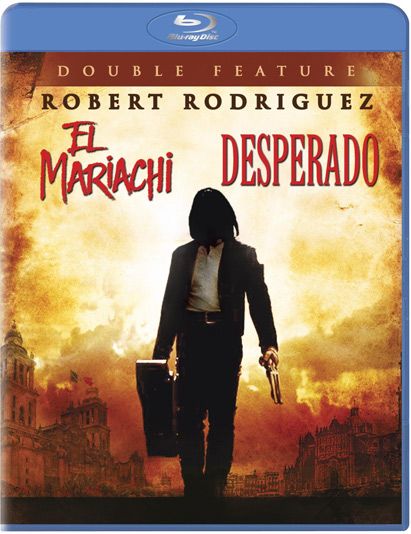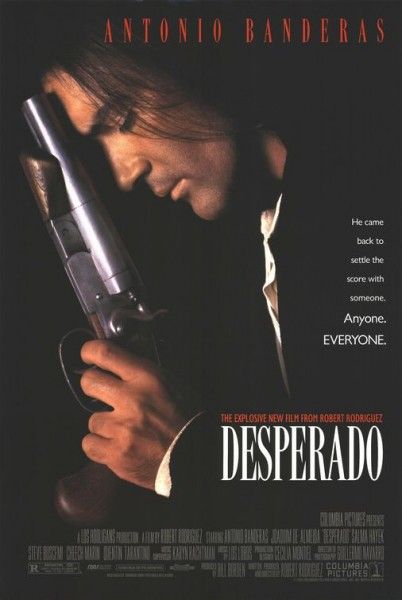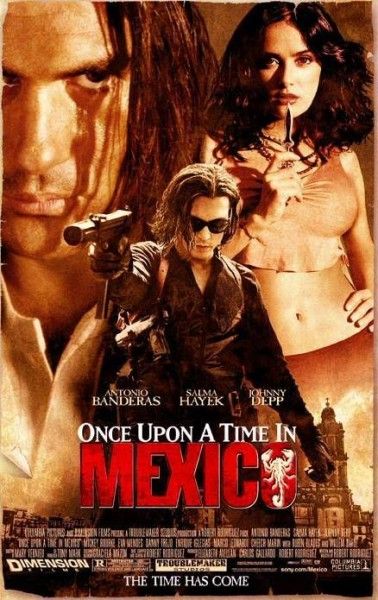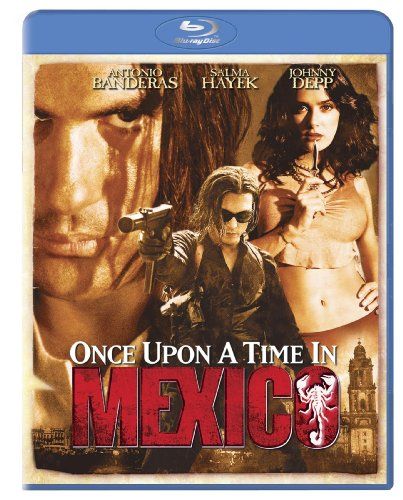With the release of the Mariachi trilogy, it’s time to reconsider Robert Rodriguez. Rodriguez emerged from Sundance in 1993, a year after Reservoir Dogs, and post Sex, Lies, and Videotape, back when Sundance seemed a hot spot for the next generation, instead of the slightly compromised festival it’s become today. Nearly twenty years later, Rodriguez is an institution, having directed thirteen movies, and numerous shorts and DVD film school classes, he was the guiding for between two franchises (the Mariachi films and the Spy Kids films), and helped another DTV series (with From Dusk til Dawn), with his directorial career divided between his films that play on action and horror for adults, and those that play on those same elements for children.
Though his partnership and work with Quentin Tarantino has kept his reputation slightly less sullied, the years have not been kind to the director/editor/cinematographer/composers/writer’s films. And revisiting the Mariachi trilogy, the problems with his movies become more and more evident as the franchise continues. My review of the Blu-rays for El Mariachi/Desperado and Once Upon a Time in Mexico follow after the jump.
When El Mariachi emerged in 1993, the big word was “I can’t believe it was made for $7,000! What a miracle, it’s entertaining!” And ultimately, the film is still fairly entertaining. What carries it over is the energy of the editing, which strikes also partly as frantic to cover the budget limitations. The problem is that the film works better as that story than a film on its own, or as an audition piece than a feature film. If you didn’t know that the film was made for seven grand (which – in truth – it wasn’t), then you might think you were watching a very cheap action movie. And that you would be.
Carlos Gallardo stars as the titular Mariachi, who comes to town around the same time as Azul (Reinol Martinez). Azul is at war with Mauricio (Peter Marquardt), and where the Mariachi keeps a guitar in his guitar case, Azul has one with a collection of guns. Mauricio, aka Moco, sends a collection of men to find a guy dressed in black with a guitar case, and that leads to some mistaken identity stuff, and the Mariachi only finds comfort from Domino (Consuelo Gómez), who is also – sadly – wrapped up with Moco. El Mariachi is just feature length, and it’s good that the film is cut to the bone, because it’s not much than the synopsis would suggest, but it moves very quickly and there are enough moments of color (be it a gang of three armed women or Azul paying for his beer) that even with two decades on the film you can see what got people’s attention. But like Kevin Smith’s Clerks, it’s a film that you can gladly do a lot of the heavy lifting for because it was done so cheaply. Held to any other standards, it’s barely passable. But it also reveals a great truth about RR’s films: he’s an independent only in terms of budget. Content-wise, he’s just making studio action films for a more reasonable price.
1995’s Desperado was his follow-up, but also a sequel and kind of a remake of his first film. Here he cast Antonio Banderas as his lead character and made Salma Hayek his love interest. It starts with what may be the best and most sustained sequence in Rodriguez’s career. Steve Buscemi plays a gringo tourist who enters a scummy bar where Cheech Marin is the bartender, and tells a story about an avenging killer Mexican who tears through a similar bar with his purpose being finding Bucho (Joaquim de Almeida). It’s a great set piece, and Buscemi does a great job of layering the performance and telling the story.
The film then flashes back to set up the premise of the film by restaging the last moments of the first film. The Mariachi is now wounded and looking for revenge on drug dealers, while Bucho grows aware of his presence, and so he gets a bunch of killers together to take him down. Like in the first film, the Mariachi meets a pretty lady - here Carolina (Hayek) - who he sleeps with and partners up with. But just like in the first film she has a relationship with the bad guy, and - it turns out - so does the Mariachi.
The best films that tend to come out of Rodriguez usually involve adapting something or someone else (Sin City, From Dusk til Dawn) or feeling competitive or boxed in (Planet Terror), and there seems to be a sense of Rodriguez trying to prove himself here. The action for the first thirty minutes are great, and the film moves at a real quick clip, while Rodriguez shows great talent at giving his minor players “business” (like Marin with his toothpick, or a gunfight that ends with two guys facing off with no bullets) that suggests a smart wit behind the camera. But the film also establishes Rodriguez’s two key problems as a filmmaker: the first is that his films are live-action cartoons, and after a while that can become wearying because events start to lose weight. Everyone is a superhero, and so you start to lose a sense of danger. His second biggest problem is escalation. Like a number of his films, there seems to be about three movies crammed in here, and the problem is that the restart button is hit so many times that you’re left with a ton of characters who leave the film and then get replaced by less interesting actors. This is still his biggest problem – he can’t sustain things long enough to make a pay off worthwhile.
In Desperado, after the film opens with panache, Banderas gets into a situation where he’s being hunted by a knife thrower (Danny Trejo) and Bucho’s people. This isn’t the worst of it, but Trejo leaves the film shortly after being introduced. As do Cheech Marin, Steve Buscemi and Quentin Tarantino. There is a constant stream of interesting character actors who are killed off during the film, but then for the third act, it introduces Banderas’s posse of Mariachi, who then get into a fight with a bunch of faceless goons, and the two additional Mariachi are killed off unceremoniously. Had these characters been set up more than five minutes before they died, it might mean something, or had they survived the fight, you’d get a sense that they were the badasses that the film implied they were, but everything that happens works against the film’s suggestion of coolness. Good ideas squandered. There’s also a character that auditions for Bucho and breaks his leg to get a job. He seems like an interesting character, but his death is unceremonious (he falls off a building). And then the end is just a jumble that doesn’t make a lot of sense. Any of the set pieces by themselves are pretty entertaining, but Rodriguez has problems connecting them in any meaningful way.
All of these problems are compounded and multiplied by the messy conclusion to this series Once Upon a Time in Mexico (2003). Here Banderas returns, but he gets in the middle of a story that is only partly about him. He’s called on out of retirement to meet with Sands (Johnny Depp), who gets him close to the man who killed his woman (off screen, between movies). Ugh, the movie is a mess, so here are all the players. Cheech Marin plays a one-eyed informant, Danny Trejo plays muscle who reluctantly works with Depp, Mickey Rourke works for an evil general played by Willem Dafoe, who’s going to change his identity, or fake plastic surgery to escape from his past deeds, Eva Mendes plays a federal agent who might not be on the level, Ruben Blades plays a retired FBI agent brought in by Sands to turn Rourke’s character, and there’s two Mariachi (one played by Enrique Iglesias) who back up Banderas.
There is a plot in here, and it’s mostly linear, but Rodriguez crams flashback fight scenes in with the narrative, and suggest that the film was meant to be a four hour epic reduced to a hundred minute running time. There’s always something going on, but little of it seems to connect. It’s the antithesis of Sergio Leone’s laid back approach, and everything is so chaotic that the film eventually A.D.D.’s itself into a frenzy of set pieces that eventually become wearying. I walked out on the film theatrically in ’03 because the film was shot digitally and the digital to film transfer made it look more amateurish than El Mariachi. But on Blu-ray the film is now very clean and beautiful looking, which helped make it more palatable. Its problems are similar but different than Desperado, but where Desperado was a disappointing follow up, Mexico benefits from being so terribly received at its time. It – like most of Rodriguez’s film - has things to like, they’re just buried and scattered.
Rodriguez has partly built his reputation on being a one man band, and that was appealing for a while, but the problems his films run into is that – like his first film – you’re supposed to make apologies for the work because it’s so DIY. That’s not really how it works when you’re making professional movies, and the problems he runs into seem directly related to his patience. His work model seems connected to this approach, but ultimately it leads to a lot of half-baked films and ideas that are often more theoretically interesting than cinematic. Like Kevin Smith, the idea of Rodriguez is usually more interesting than his art - though every once in a while he puts something of worth out. But the hit to miss ratio (sometimes, even in one film) is such that Rodriguez’s workmanlike ethos eventually works against him. Watching this trilogy again, it points out that RR is a talent, but one who rarely lives up to his own potential.
Sony’s Blu-rays are excellent. The double feature offers the first two films in widescreen (1.78:1) and with el Mariachi in 2.0 DTS Stereo, while Desperado is in 5.1 DTS-HD surround. The first film comes in Spanish with English subtitles, and also with a dubbed English Language track. Both films come with Rodriguez commentary tracks (back from the Laserdisc era), and they are still solid behind the scenes tracks. The first film comes with a “10 Minute Film School” (15 minute), and his short film “Bedhead” (9 min.), while the second film comes with “10 More Minutes: Anatomy of a Shootout” (10 min.), which shows storyboards and behind the scenes footage, it’s followed by two music videos. There’s also the “Cutting Room Floor” which lets you re-edit sequences in the film and share them online.
Once Upon a Time in Mexico gets a disc to itself, and is presented in widescreen (1.78:1) and in DTS-HD 5.1 surround. This film also comes with a Rodriguez commentary and cutting room. Here are also eight deleted scenes with optional Rodriguez commentary (7 min.), and another “ten minute film school” (9 min.). “Inside Troublemaker Studios” (11 min.) offers a look inside Rodriguez’s house/studio. This is followed by a “10 Minute Cooking School” (6 min.). “Film is Dead: An Evening with Robert Rodriguez” (13 min.) has a presentation by Rodriguez on how he shot the film on video, and intercuts behind the scenes footage with his talk. “The Anti-Hero’s Journey” (18 min.) is the making of, while “The Good, The Bad and the Bloody: Inside KNB EFX” (19 min.) gives the make-up and effects guys their due. All of these supplements are taken from the film’s original DVD release, so all the interviews and extras are presented in standard definition.





